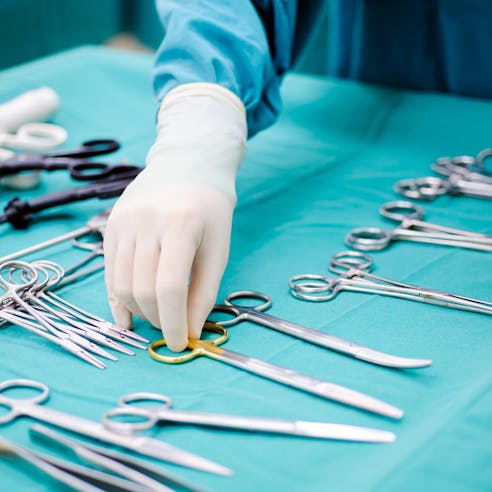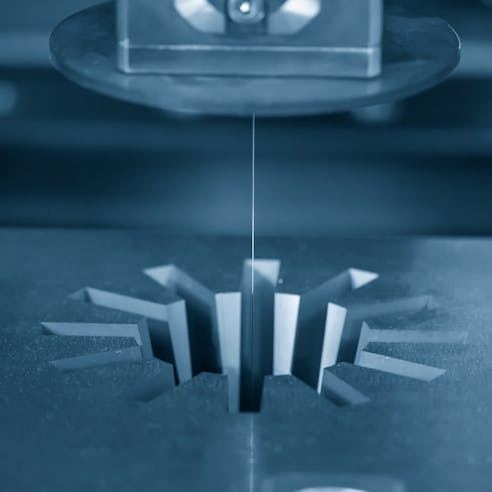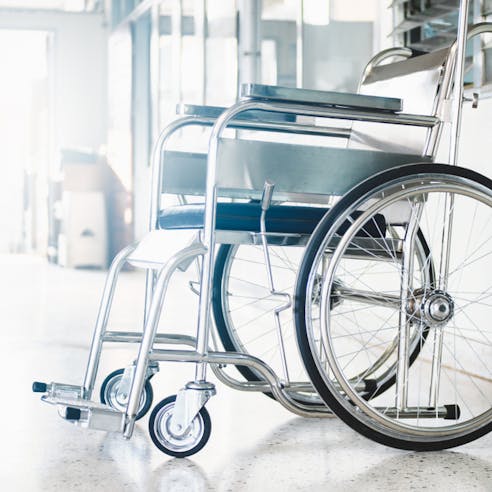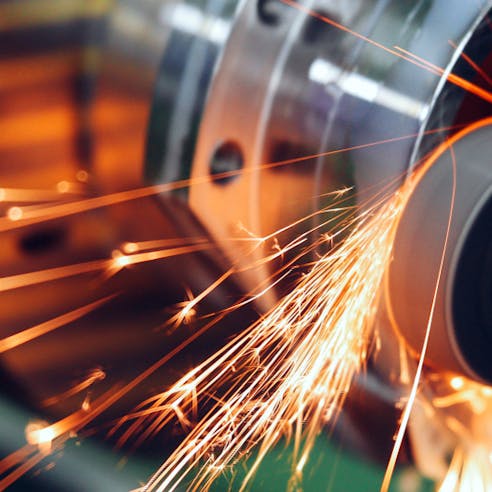Medical CNC Machining Service
Get instant quotes on custom metal and plastic machined parts with our Medical CNC Machining Service. Make quick turn prototypes and production parts in days with free standard shipping on all US orders. ISO 9001:2015, ISO 13485, IATF 16949:2016, and AS9100D certified. ITAR registered.
The medical manufacturing industry requires parts to satisfy product specifications and end-user needs and comply with various healthcare industry regulations and standards.
Xometry is an ISO 9001:2015, IATF 16949:2016, and ISO 13485-certified manufacturer that offers high-quality medical CNC machining services for the production of medical products such as implants, medical devices, and surgical instruments. The primary types of CNC machining utilized include wire EDM, 5-axis Precision CNC Machining, and Swiss Lathe CNC Machining. Material options for medical CNC machining include stainless steel, aluminum, titanium, and copper, as well as plastics such as PE, nylon, and PVC.
With Xometry, you are ensured of precise components, quick turnaround, and excellent customer service. Our robust capabilities and offerings make us a premier supplier for the medical manufacturing industry.
Applications of Medical CNC Machining
CNC machining in the fabrication of medical parts are ubiquitous, regardless of whether the part is metal, plastic, ceramic, or composite. While plastic medical parts can be molded, cast, or extruded, CNC machining is often used to produce the molds or extrusion dies required for the production processes. Below are some of the most common applications for medical CNC machining:
- Medical Devices
- Medical Implants
- Surgical Instruments
- Dental Instruments

Medical Devices
A medical device is any item that is intended for a medical purpose. Medical devices can be anything from diagnostics and radiography to monitoring and treatment. Some common medical devices are listed below:
- Stethoscopes
- Ventilator parts
- Electrocardiograph (EKG), X-ray, and MRI machines
- Blood pressure monitors
- Catheters
- Stretchers and hospital beds
- Defibrillators
- Prostheses
These devices and associated subcomponents can be machined using various materials, including stainless steel, aluminum, titanium, PE, PVC, and nylon.
Components in ventilators, EKG, X-ray, and MRI machines, stretchers, hospital beds, and prostheses, can be directly machined via a 5-axis CNC machine, Swiss lathe, or standard CNC milling machine. Other components may require plastic injection molding or plastic extrusion to fabricate parts. In such cases, 5-axis CNC milling or wire EDM can be used to produce plastic injection molding die sets or extrusion die sets.
Medical Implants
Medical implants refer to anything that is implanted or embedded into a patient surgically. These items require both exceptionally precise dimensions and biocompatible materials. Some examples of medical implants are listed below:
- Joint replacements
- Spine screws and rods
- Pacemakers
- Drug delivery devices
- Coronary stents
Common materials for implants include titanium, titanium alloys, and cobalt-chromium. Precise 5-axis CNC milling and wire EDM are two medical CNC machining methods perfect for the fabrication of medical implants and related components.
Surgical Instruments
Surgical instruments are tools and equipment used by doctors and medical staff during surgery. These must be made with a biocompatible material, free of surface contaminants including corrosion, and made to precise tolerances. Surgical instruments require precise dimensions and biocompatible materials. Some examples of surgical instruments are listed below:
- Surgical scissors
- Scalpels
- Forceps
- Clamps
- Retractors
Surgical stainless steel and titanium are two of the most commonly used materials in medical CNC machining. 5-axis CNC machining, Swiss lathe, and CNC milling are all applicable processes when CNC machining surgical instruments.
Dental Instruments
Dental instruments need to be made with biocompatible materials, with no surface contaminants and produced with precise tolerances. Some examples of dental instruments are listed below:
- Dental probes and scalers
- Dental mirrors
- Retractors
- Dental drills
- Suction devices
Two most common materials for dental instruments are stainless steel and titanium. Metal instruments like probes, scalers, and mirrors can easily be made with a 5-axis CNC milling machine or a Swiss lathe. Plastic materials, such as those in suction devices, are made with PVC or PE and can be fabricated through a plastic injection die set or an extrusion die. These die sets are commonly made to precise tolerances using 5-axis CNC milling and/or wire EDM.
Types of Medical CNC Machining by Xometry
Xometry has extensive CNC capability for the medical manufacturing industry including: 3-axis milling machines, CNC lathes, 5-axis CNC milling machines, and wire EDM machines.
See more information below:
- Wire EDM Medical Machining
- 5-Axis CNC Medical Machining
- Swiss CNC Medical Machining
- Medical CNC Milling

Wire EDM Medical Machining
Xometry offers wire EDM medical machining to fabricate medical parts and components. Wire EDM is a non-conventional machining process in which cuts are made with an electrically conductive wire. This results in parts with shallow surface roughnesses (down to 1.5 µm Ra) that satisfy extremely tight tolerances (+0.0025 mm).
Wire EDM is highly applicable for medical CNC machining, as various medical devices like surgical tools and bone plates require precision. This technology is commonly used for the fabrication of plastic injection molds and extrusion dies. Wire EDM can also be used to cut any electrically conductive material.
5-Axis CNC Medical Machining
Xometry offers 5-axis CNC medical machining which has an advantage over simpler 3- and 4-axis machining. It allows parts to be moved about 5 degrees of freedom simultaneously. This enables cutting tools to approach parts from any direction. Consequently, it allows complex shapes that otherwise would not be possible to be cut on a 3- or 4-axis machine to be cut with precision.
5-axis CNC machining is ideal for medical devices such as joint replacements, prostheses, and various surgical and dental instruments—not to mention its use for the fabrication of molds and dies. Common materials used in the medical industry with 5-axis machining include titanium, stainless steel, chromium-cobalt, and aluminum.
Swiss CNC Medical Machining
Xometry offers Swiss CNC medical machining, a precision manufacturing machine that produces very small parts quickly and accurately. The primary advantage of swiss CNC machines over standard CNC lathes is that multiple cutting operations that would normally require multiple setups can occur simultaneously. This is due to the presence of multiple spindles for cutting tools—as well as the ability to make cuts along the Z-axis of the part. What results, are highly precise, complex parts that otherwise could not be cut on a standard lathe. Swiss CNC medical machining is ideal for round parts such as those found in prostheses, joint replacements, and surgical and dental instruments. Common materials include stainless steel, aluminum, titanium, and chromium-cobalt.
Medical CNC Milling
Xometry offers standard 3- and 4-axis medical CNC milling. Medical CNC milling’s advantage is the rapid turnaround of parts and parts that fall within tight tolerances. Common materials include stainless steel, titanium, aluminum, chromium-cobalt, PVC, PEEK, nylon, and PE.

Need CNC machined medical parts?
Free shipping available for domestic CNC orders ; learn more!
Medical CNC Machining Materials
Any material considered acceptable for medical devices must meet high standards of reliability and performance. Below are some common materials used for medical CNC machining:
- Xometry Includes CNC Machining in Aluminum
- Xometry Includes CNC Machining in Stainless Steel
- Xometry Includes CNC Machining in Titanium and Titanium Alloys
- Xometry Includes CNC Machining in Brass
- Xometry Includes CNC Machining in Polyethylene (PE)
- Xometry Includes CNC Machining in Nylon
- Xometry Includes CNC Machining in Polyvinyl Chloride (PVC)

Xometry Includes CNC Machining in Aluminum
Aluminum is often used in the medical industry due to its lightweight, high strength-to-weight ratio, durability, and corrosion resistance. It is also biocompatible and can be used for limited internal use in the human body. Common applications include:
- Surgical and dental instruments (scalpels, clamps, and scalers)
- Hospital equipment (trays, containers, rolling carts, and parts in devices like ventilators and imaging equipment)
Common alloys of aluminum include:
- 6061
- 6063
- 3003
Xometry Includes CNC Machining in Stainless Steel
Stainless steel’s desirable properties including strength, toughness, corrosion resistance, impact resistance, and biocompatibility make it ideal for many uses in the medical industry. Its thermal stability and outermost passivation layer allow parts to be easily cleaned and sanitized. Common applications include:
- Bed frames
- Wheelchairs
- Artificial heart valves
- Prostheses
- Catheters
- Syringes
Common stainless steel grades used in the medical industry include:
- 304
- 304L
- 316L
Xometry Includes CNC Machining in Titanium and Titanium Alloys
Titanium and its alloys are used in the medical industry because of their strength, low weight and density, and corrosion resistance. Titanium is one of few inert metals and unaffected by bodily fluids and tissue. Common applications include:
- Pacemakers
- Joint replacements
- Bone plates
- Surgical and dental tools
Common titanium alloys used in the medical field include:
- Ti 6Al4V (Grade 5)
- Ti 6AL4V ELI (Grade 23)
Xometry Includes CNC Machining in Brass
Brass is finding increased use in the medical industry due to its antimicrobial properties, cost-effectiveness, ease of recycling, and adequate strength. Copper, the main metal in brass, has inherent antimicrobial properties that mitigate the proliferation of bacteria and pathogens. Common applications include:
- Valves
- Pressure regulators
- Touch surfaces such as doorknobs
- Electronics in medical devices
Xometry Includes CNC Machining in Polyethylene (PE)
Polyethylene (PE) is commonly used in the medical field due to its ability to retain structural integrity even after several sanitation cycles and biological inertness. Xometry can both directly machine PE to a finished product and various plastic manufacturing tooling needed to fabricate parts. Common applications include:
- Personal protective equipment (PPE) (gloves and suits)
- Sanitary packaging (pill bottles, containers, and lid stock)
- Prostheses
Xometry Includes CNC Machining in Nylon
Nylon’s tensile strength, flexibility, abrasion resistance, corrosion resistance, and chemical resistance properties make it an excellent material for the medical industry. Xometry can fabricate the plastic manufacturing tooling needed to produce parts from nylon such as molds and extrusion dies. Common applications include:
- Prescription bottles
- Stent delivery systems
Xometry Includes CNC Machining in Polyvinyl Chloride (PVC)
Polyvinyl chloride (PVC) is an ideal material for use in the medical industry. Some of its desirable properties include flame resistance, chemical resistance, and durability. Common applications are:
- IV and blood transfusion bags
- Tubing,
- Catheters
- Prostheses
Advantages of Medical CNC Machining with Xometry
Medical CNC machining with Xometry is easy. Our AI-powered instant quote tool allows you to quickly see the feasibility of manufacturing your part, while our extensive manufacturing network ensures your parts will be made to exact specifications, fast.
For more information see below:
- Precision Components
- Rapid Turnaround of Parts
- Extensive Manufacturing Capability and Capacity

Precision Components
The fabrication of medical devices and components requires precision. With Xometry, precise components that satisfy exceptionally tight tolerances (down to +0.0025 mm) are well within our capabilities. Our robust manufacturing capability and network mean that seemingly any part can be fabricated. Whether it’s surgical and dental tools, components for medical devices, or parts for prostheses, our wire EDM, 5-axis CNC machines, Swiss lathes, and standard CNC milling and lathe machines will ensure your parts satisfy regulatory standards and are made to exact specifications every time.
Rapid Turnaround of Parts
The medical industry’s demand for high-quality parts also requires fast delivery to satisfy their customers. With Xometry, our expansive manufacturing capability and extensive network of partner manufacturers (over 10,000 vetted manufacturing facilities around the world), allow the fabrication and shipping of parts significantly faster than the competition. Whether for prototyping or scaling up to mass production, rapid turnaround of parts is standard with Xometry.
Extensive Manufacturing Capability and Capacity
When working with Xometry, businesses are no longer confined to the suppliers local to them. Our network of 10,000+ vetted manufacturing facilities in 44 states and 22 countries around the world means our manufacturing capabilities and capacity are seemingly endless. Our capabilities aren’t limited to just CNC machining for the medical industry; they also include sheet metal fabrication, injection molding, additive manufacturing, and various finishing processes including anodization, passivation, and powder coating. Whatever your medical manufacturing project is, Xometry has the tools and resources available to ensure your project is successful.
Why Choose Xometry for Medical CNC Machining?

Endless Options
Choose from millions of possible combinations of materials, finishes, tolerances, markings, and certifications for your order.

Easy to Use
Get your parts delivered right to your door without the hassle of sourcing, project management, logistics, or shipping.

Quality Assurance
We are ISO 9001:2015, ISO 13485, IATF 16949:2016, and AS9100D certified.